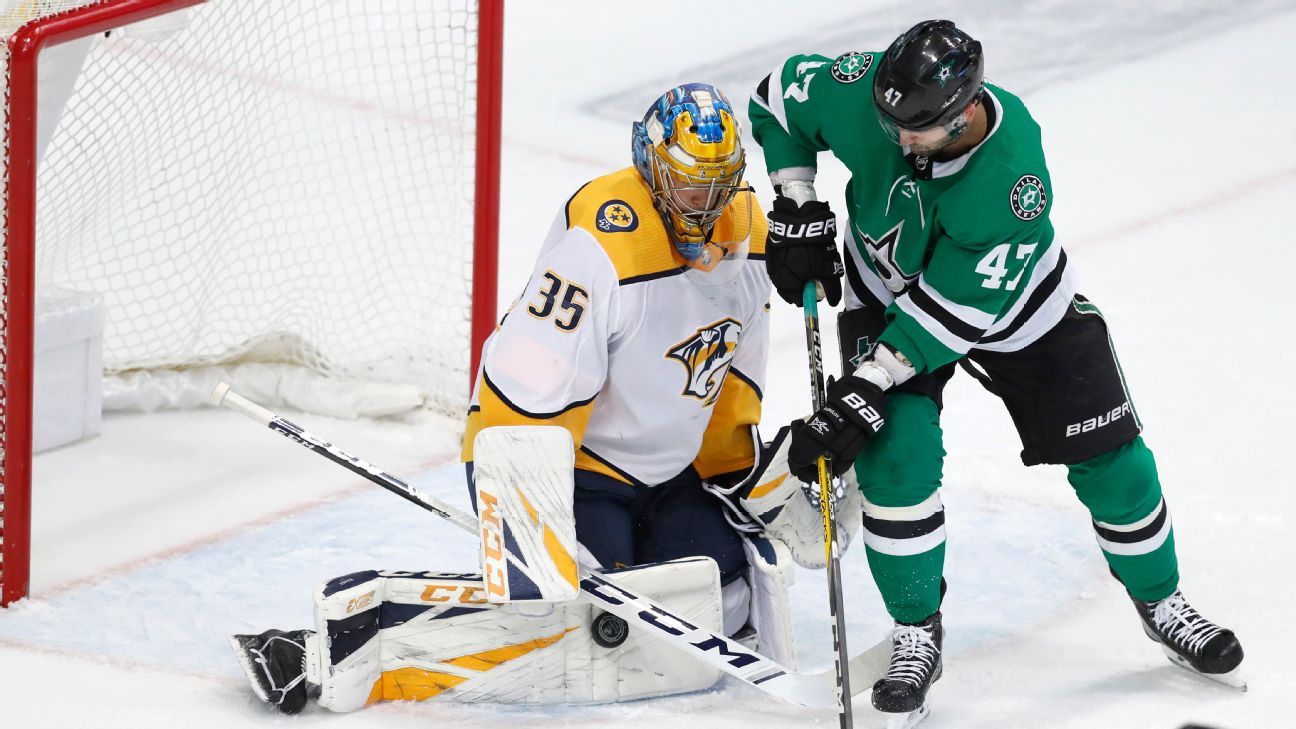The Nashville Predators look poised for another deep run in the 2019 Stanley Cup playoffs. But Tyler Seguin and the Dallas Stars are standing in their way in the first round. Who will take this series? Let’s break it down:
How they got here: The Predators staved off the surging St. Louis Blues and the slumping Winnipeg Jets to clinch the Central Division title, but there’s been an elephant in the room when discussing Nashville’s season: Though the Preds are as good on paper as they’ve ever been, they haven’t looked quite right. Nashville endured some early injuries, including to its top two wingers, Viktor Arvidsson and Filip Forsberg. The power play has been, at times, a pain to watch. The midseason acquisitions did not jell quite like general manager David Poile imagined. And yet, the Predators persevered, thanks in part to having one of the league’s most elite and complete defensive groups. Goaltender Pekka Rinne has looked typically solid.
No matter how it ultimately ends, this Stars’ season likely will be remembered as the one where the team’s CEO, Jim Lites, called out its two star players in a profanity-filled rant. Farm animal excrement aside, the Stars continued on, adjusting to their third coach in as many years and earning a playoff berth without collapsing, as they did late last season. Offense has been hard to come by for this group, but rookie head coach Jim Montgomery pivoted from his initial game plan, honing in on a tough-checking defensive structure that worked. Goaltending, between primary starter Ben Bishop and backup Anton Khudobin, has been spectacular.
First line: Talent-wise, Dallas has an elite first line, though Jamie Benn‘s production has slipped this season (only 53 points, down from 79 last season). Seguin rebounded from his CEO’s criticism, reaching 80 points for the first time since 2013-14, his first season in Dallas. (Seguin had 48 points in 44 games since the infamous callout). Both Forsberg and Arvidsson missed time in the fall, which is a shame; Arvidsson was close to being Nashville’s first 40-goal scorer (he ended up with 34 in just 58 games played). Advantage: tie
Depth: The Stars scored just 209 goals this season, third fewest in the league, and 89 of them (nearly 43 percent) came from the top line. Though Dallas may get a jolt from trade-deadline acquisition Mats Zuccarello, the bottom nine don’t strike much fear. Nashville hasn’t received the production it expected from players it traded for over the past two seasons, including second-line center Kyle Turris (23 points in 53 games), rental Wayne Simmonds (three points in 17 games) or Mikael Granlund (five points in 16 games). They’re still deeper than the Stars are. Advantage: Predators
Defense: The Predators’ top four are often lauded as the league’s most complete quartet. The Predators get some extra help via Dante Fabbro, the 2016 first-round pick who finally arrived from college. The Stars’ blue line — bolstered by breakout performances from 19-year-old Miro Heiskanen (23:06 in ice time per game) and 24-year-old Esa Lindell (24:19) — has been equally stingy, finishing in the top five leaguewide in goals allowed per game. Advantage: tie
Goaltending: Bishop hasn’t played in the postseason since 2016, and he looks poised to do some damage again. Bishop is garnering serious Vezina Trophy consideration after an excellent season, going 27-15-2 with a .934 save percentage and 1.98 goals-against average. Rinne, meanwhile, is the reigning Vezina winner who had another strong campaign. He’s looking to avoid another postseason flop, though. Advantage: tie
Coaching: Rookie NHL coach Jim Montgomery wanted the Stars to generate offense as an uptempo, possession team, but he had to adjust based off the personnel. Instead, Dallas ran a tight-checking defensive structure, which was effective if not exciting. In his previous stops, Montgomery has a history of magical postseason runs. Peter Laviolette, meanwhile, is more seasoned, having accumulated 229 wins over 410 games with the Predators. Laviolette is known for tweaking his lineups to find the right matchups come playoff time. Advantage: Predators
Health: Both teams had to weather injuries earlier in the season, but they aren’t managing anything significant at this moment. Advantage: tie
Special teams: One of the hardest things to watch this season was the Predators’ power play, which was dreadful — hitting at a league-worst 12.9 percent. The additions of Brian Boyle and Simmonds were expected to help, but they haven’t yielded much thus far. The Stars were above league average at 21.0 percent. Both teams boast excellent, top-10 penalty kills. Advantage: Stars
Prediction: Predators in six

